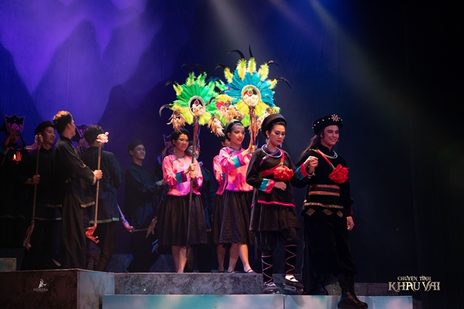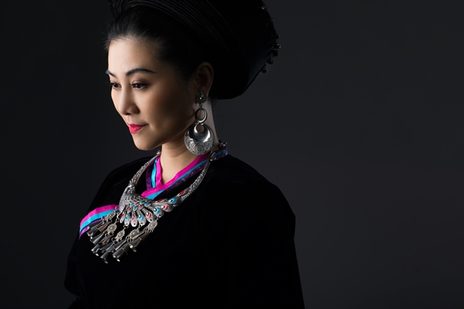(News) - A performance of Chuyện Tình Khâu Vai (Khâu Vai Love Story) will be returning to the stage at the end of July.
The play was penned by Nguyễn Thế Kỷ and director Triệu Trung Kiên and tells the story of the cultural beauty of ethnic people on Đồng Văn Plateau in the mountainous province of Hà Giang, which is home to the Chợ Tình Khâu Vai (Khâu Vai Love Market).
This love market takes place every year on March 27 in the lunar calendar. It is a place for lovers who have been forbidden from being together to come and vent their frustrations and share the sad and joyful things in life for one night only.
The main characters in the play are Ba — a poor boy of the Nùng ethnic group, and Út — the daughter of the Giáy ethnic group chief. They love each other but cannot marry due to their ethnicity and class.
The couple escape to the top of Khâu Vai Mountain to be together, but have to return to their villages to fulfill their filial duties. They promise to see each other the same time next year and swear that only death can keep them apart.
However, Ba plotted to harm Út’s father so he could be with his beloved, who was also carrying his child.
Út was so heartbroken she committed suicide on Khâu Vai. When Ba found out he wanted to end his life too, but could not due to his duty to his family.
Every year he visits Khâu Vai peak and remembers the old vow.
HCM City audiences who saw the play also took the time to enjoy a display of posters and ethnic household goods before they entered the theatre.
The image of Khâu Vai Village in the middle of a vast mountainous forest shared online has made a special impression on the public, and many of the posters featuring the artists in costume and in character set to the backing of the majestic landscape are also eye-catching.

Khâu Vai Story was performed in HCM City early this month.
To promote the play the producers launched a website with pictures, clips and information about the characters, rehearsals and behind-the-scenes stories.
A competition has also been launched to win tickets for the second run.
The producers also took a field trip to Khâu Vai in Đồng Văn District, which is where Út and Ba are from.
“The artists and I went to Hà Giang Province to get to know the harshness of the area. People there literally live on rocks and die in stone,” said director Kiên.
“I think the trip was totally worthwhile. The artists could feel the atmosphere of Khâu Vai and had more materials and emotions to perform. This helped to breathe life into the play.”
The artists crossed thousands of kilometres to experience the culture of Đồng Văn to get a better understanding of the land and the people. They met local people and listened to them recount the legend of Út and Ba's love story.
To provide a genuine setting, Kiên also bought domestic items such as old mortars, a wooden plough and a weaving loom.
The show audience see display featuring posters and daily home objects in northeastern region.
This is something unprecedented in cải lương (reformed opera) performances.
The field trip changed the way we express the characters’ personalities. “After reading the script I decided to play the patriarchal character as a despot,” said artist Lê Tứ.
“But after visiting Khâu Vai and meeting the people, I realised the patriarch character's imposition was not derived from the harsh and arbitrary nature there, but formed by old and depraved customs.”
“That made me play the character in a more generous and liberal way but still bound by ancestral customs,” said Tứ.
Actress Quế Trân plays Út character in Khâu Vai Love Story. In the beginning, she thought Út's character was very close in appearance and personality to many roles she had performed, but she felt differently after the trip to Khâu Vai.

Actress Quế Trân in her role design. Photos Hemera Pictures.
“I am not unfamiliar with the difficult life of the northern mountains but I was surprised and admired their innocence and optimism,” said Trân.
“I observed the women and girls in Khâu Vai and visited the statue of Út in the temple. I realised that no matter what circumstances they lived in they were not weak just stricken by fate.
“They are strong enough to realise their desire for freedom to live for themselves and dare to fight to protect their love."
During the two-hour show, Lê Tứ, Quế Trân, Quang Khải and many others captivated the audience with inspiring acting, singing and dancing. They truly conquered the audience which included directors, theatre critics and veteran artists.
The show was not a sell-out on June 7 and 8 but the organisers had anticipated that.
“We need a certain amount of time to build trust from the audience,” said Hoàng Song Việt, director of Đại Việt Cải Lương Theatre.
“The big surprise for us is there are a lot of people buying tickets for the second show. We are very happy because the audience rarely watch a cải lương show a second time.”
The success of the show must include the participation of different teams including stage design, advertising and communications who have managed to bring a new look to the traditional art form.
Stage design contributes to creating emotions during the show. The symbol of love on the Hà Giang stone plateau is portrayed with poetic beauty created by mountains, forests and clouds on the top of Khâu Vai.
The beautiful natural landscape and traditional festivals of the Giáy and Nùng ethnic groups are also highlighted in the play.
In addition, music by Trọng Đài with vocals from Mai Hoa have made a strong impression on the audience.
Audiences who missed the play early this month will have chance to catch it on July 25 and 26 at the Municipal Theatre, 7 Công Trường Lam Sơn, District 1.
Some people are even buying tickets to see the play for a third time, according to Việt.
Source: VNS
VNQD